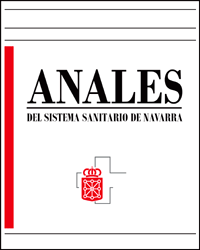Consequences of heroin consumption: compartmental syndrome and rhabdomyolysis
Keywords:
Síndrome compartimental. Rabdomiolisis. Heroína. Insuficiencia renal.Abstract
Compartment syndrome is a condition in which increased pressure within a limited space compromises tissue perfusion with the development of rhabdomyolysis. The causes can be physical, such as the pressure exerted on an anatomical region, or it can be associated with the consumption of illegal drugs, especially heroin. In this latter case, toxic and immunological mechanisms are involved in the physiopathology. Acute renal failure develops in 30% of cases of rhabdomyolysis. Its treatment includes efficient volume replacement, forcing urinary alkalinization and the administering of furosemide and mannitol, with certain precautions. No benefit has been shown in dopamine. When a heroin addict patient shows a clinical pattern of tumescence of his extremities, with or without a period of unconsciousness, the presence of compartment syndrome is to be suspected.Downloads
Downloads
Published
How to Cite
Issue
Section
License
La revista Anales del Sistema Sanitario de Navarra es publicada por el Departamento de Salud del Gobierno de Navarra (España), quien conserva los derechos patrimoniales (copyright ) sobre el artículo publicado y favorece y permite la difusión del mismo bajo licencia Creative Commons Reconocimiento-CompartirIgual 4.0 Internacional (CC BY-SA 4.0). Esta licencia permite copiar, usar, difundir, transmitir y exponer públicamente el artículo, siempre que siempre que se cite la autoría y la publicación inicial en Anales del Sistema Sanitario de Navarra, y se distinga la existencia de esta licencia de uso.








